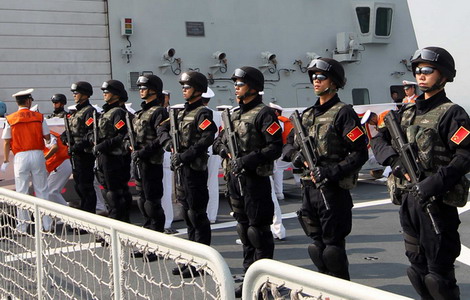PBOC poised to fine-tune policy
Updated: 2011-11-03 20:07
(Xinhua)
|
|||||||||||
BEIJING - The People's Bank of China (PBOC), the country's central bank, stopped draining liquidity from banks through its open market operations this week, moving one step closer to easing its monetary tightening measures inspired by economic slowdown and external jitters.
Completing its regular weekly open-market operations, the PBOC on Thursday auctioned only one billion yuan ($158 million) of three-month bills at an unchanged yield of 3.1618 percent.
Hedging against 107 billion yuan in bills and repurchase agreements due this week, the PBOC released 96 billion yuan into the money market this week through open-market operations on Tuesday and Thursday.
It was the PBOC's first net cash injection in four weeks through open-market operations after net liquidity drainage for three consecutive weeks.
Analysts said the PBOC's change of policy sent a signal for the country's credit-tightening measures to be selectively eased after Premier Wen Jiabao said on October 25 in the northern municipality of Tianjin that China will fine-tune the country's macro control policies when the time is right.
Chen Lan, a research fellow with Guotai Junan Securities, said the central bank aimed to relieve liquidity pressure in the market by the net cash injection and sales suspension of three-year bills, which can freeze liquidity for a much longer term.
Thanks to the PBOC's cash injection, banks' liquidity conditions improved, as suggested by the falling Shanghai Interbank Offered Rate (SHIBOR), which measures the cost for banks to borrow from one another.
In China's money market, the one-week SHIBOR fell 29.83 basis points to 3.3975 percent on Thursday, the two-week SHIBOR dropped 5.84 basis points to 3.3783 percent after weakening 62 basis points on Wednesday.
The equity markets in China rose for two straight days on Thursday, outweighing fresh worries about Greece's default owing to a call for a referendum on the European rescue fund. The Shanghai Composite Index added 0.16 percent while the smaller Shenzhen Component Index picked up 0.4 percent.
As the market is widely expecting a selective easing of the country's tightening measures in the near future, the central bank will be more flexible in its open-market operations over the coming months, said Lu Zhiming, a researcher at the Finance Research Center of the Bank of Communications, China's fifth largest lender.
Lu said the growth of new loans and the broad money supply (M2) will expedite gradually till the end of this year.
According to the PBOC data, yuan-denominated new loans stood at 5.68 trillion yuan between January and September, 597.7 billion yuan less than a year ago. The growth of M2 for the first three quarters of 2011 stood at 13 percent year-on-year, 6.7 percentage points lower than at the end of last year.
Lian Ping, chief economist at the Bank of Communications, said he believed banks' lending to designated sectors and small and micro-sized businesses will loosen in November and December, as signaled by the policy fine-tuning.
"Meantime, sales of small and micro-sized enterprises bonds will also relieve their financial strains," Lian said.
Related Stories
PBOC deeply regrets US Senate's yuan bill 2011-10-04 13:13
More global co-op needed to address downside risks: PBOC chief 2011-09-25 07:39
PBOC survey hints at tendency to save more 2011-09-16 09:20
Inflation expectations on the rise: PBOC survey 2011-09-16 09:01
Hot Topics
Libya conflict, Gaddafi, Oil spill, Palace Museum scandal, Inflation, Japan's new PM, Trapped miners, Mooncake tax, Weekly photos, Hurricane Irene
Editor's Picks

|

|

|

|

|

|







